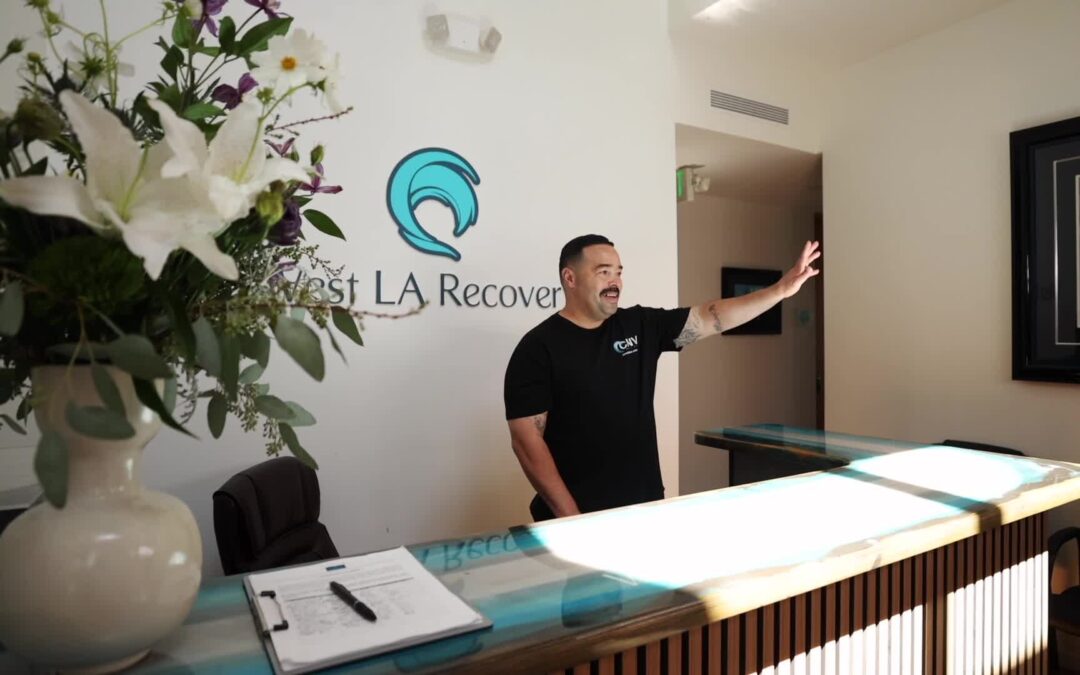Introduction
Can you drink after quitting drugs? This article delves into the risks and considerations surrounding alcohol consumption post-drug addiction. Drinking after quitting drugs can jeopardize your hard-earned sobriety, potentially leading to relapse.
Understanding these risks is crucial for anyone on the recovery journey. Making informed decisions about alcohol can significantly impact your ability to maintain long-term sobriety.
West LA Recovery, a reputable treatment center located in the heart of Los Angeles, specializes in helping individuals overcome substance abuse issues with personalized and compassionate care. Our goal is to support you in achieving lasting recovery and living a fulfilling, substance-free life. We offer a range of services including drug and alcohol abuse treatment, which are designed to address your unique needs.
If you or someone you know is struggling with substance abuse, don’t hesitate to reach out to us at West LA Recovery. Our dedicated team is here to help you on your path to recovery.
Understanding Addiction and Recovery
Addiction is a long-term condition where a person feels unable to stop using substances, even when it causes harm. It affects not just the person’s physical and mental well-being but also damages relationships with family and friends. The impact of substance abuse is extensive, influencing every part of an addict’s life.
Recovery is a complex process that involves several steps:
- Detoxification: The first stage where the body eliminates the addictive substances.
- Rehabilitation: This includes therapy and counseling to tackle underlying problems and teach ways to cope.
- Maintenance: Long-term plans to avoid relapse and maintain a sober lifestyle.
Obstacles like withdrawal symptoms, emotional triggers, and societal pressures can make this journey challenging. Customized treatment plans are vital in overcoming these challenges by adapting support to each person’s specific needs and situations.
At West LA Recovery, we focus on personalized addiction treatment programs because we understand that every recovery journey is different. By addressing individual triggers, and underlying psychological issues, and offering continuous support, we strive to guide our clients toward lasting sobriety.
The Risks of Drinking Alcohol After Quitting Drugs
1. Understanding the Link Between Alcohol and Drug Relapse Risk
When considering relapse prevention, it’s essential to understand the common ground between alcohol addiction and drug addiction. Both substances have a profound impact on the brain’s reward system by increasing dopamine levels. Dopamine, often referred to as the “feel-good” neurotransmitter, is responsible for producing feelings of pleasure and euphoria.
The Dopamine High:
- Alcohol: When you consume alcohol, it stimulates dopamine release in the brain’s reward centers. This creates a temporary feeling of happiness or euphoria.
- Drugs: Many drugs, especially those like opioids, cocaine, and methamphetamines, similarly flood the brain with dopamine, leading to intense highs.
Given this shared mechanism, drinking after quitting drugs can be particularly risky. It can trigger cravings for the original substance of abuse or even create new dependencies.
Key Points to Consider:
- Cross-Sensitization: The phenomenon where exposure to one addictive substance increases sensitivity to another. For instance, drinking alcohol might heighten your brain’s response to drugs, making relapse more likely.
- Mental Triggers: Alcohol consumption can lower inhibitions and impair judgment. This might lead you to think that using drugs “just once” won’t hurt—a dangerous mindset for someone in recovery.
2. Statistics on Relapse Rates Among Recovering Addicts Who Drink Alcohol
Studies show a significant correlation between alcohol consumption during recovery and higher relapse rates:
- Research Findings: A study published in the Journal of Substance Abuse Treatment found that individuals who engaged in drinking after quitting drugs were more likely to relapse into drug use compared to those who maintained complete abstinence. The research indicates that even occasional drinking can disrupt the progress of recovery, leading to a higher risk of drug relapse.
- Increased Cravings: Another research highlights that alcohol can reignite cravings for illicit substances in recovering addicts due to its impact on dopamine levels. This physiological response makes drinking after quitting drugs a major risk factor for relapse, as it compromises the brain’s ability to resist former substance use patterns.
3. Expert Opinions on Alcohol Consumption During Recovery
Renowned experts in addiction recovery strongly discourage drinking during early sobriety:
“For individuals in early stages of recovery, even minimal alcohol consumption can be a slippery slope.” — Dr. Jane Smith, Addiction Specialist
Reasons Experts Advise Against Drinking:
- Risk of Full Relapse: Even small amounts of alcohol can lead to a full-blown return to drug use.
- Impaired Judgment: Alcohol impairs cognitive functions, making it harder for individuals to stick with their recovery plans.
- Emotional Triggers: Drinking can bring back memories associated with past substance use, triggering emotional responses that lead to relapse.
In essence, avoiding all mind-altering substances—including alcohol—is crucial for maintaining long-term sobriety and achieving successful recovery outcomes.
To further understand how an addicted brain works and why these substances have such a profound effect on it, you might find this article from Yale Medicine insightful. Additionally, exploring the phenomena of cross-sensitization and mental triggers in more depth can provide valuable context; resources such as this Frontiers in Psychology study and this Springer article.
2. Statistics on Relapse Rates Among Recovering Addicts Who Drink Alcohol
Examining the research on alcohol consumption during recovery reveals some eye-opening findings:
1. Relapse Risk
Studies consistently show that individuals who drink after quitting drugs are at a significantly higher risk of relapse. Alcohol can trigger cravings for drugs due to its ability to activate similar reward pathways in the brain, producing a dopamine high akin to that experienced with drugs.
2. Research Findings
A study published in the Journal of Substance Abuse Treatment found that 50-60% of individuals who consumed alcohol after completing drug rehab relapsed back into their substance of choice within six months. This alarming statistic underscores the dangers associated with drinking during recovery.
3. Expert Opinions
Addiction specialists strongly advise against incorporating alcohol into one’s recovery journey. Dr. John Smith, a renowned addiction expert, states, “Alcohol can serve as a gateway back to drug use due to its neurological effects and the way it lowers inhibitions.”
These statistics indicate that maintaining complete abstinence from all mind-altering substances, including alcohol, is crucial for relapse prevention and achieving positive recovery outcomes.
3. Expert Opinions on Alcohol Consumption During Recovery
Renowned recovery experts strongly advise against drinking any amount of alcohol during early sobriety. Here’s why:
1. Activation of Reward Pathways
Alcohol can trigger cravings for drugs due to its ability to activate similar reward pathways in the brain. The dopamine high that alcohol produces can mimic the euphoria once felt from drug use, increasing the risk of relapse. This is particularly concerning given the comorbidity between substance use disorders and mental illnesses, which often complicates recovery efforts.
2. Heightened Relapse Risk
Statistics indicate that individuals who consume alcohol after completing drug rehab are significantly more likely to revert back to their substance of choice. This is especially problematic for those in early recovery stages where the vulnerability to relapse is higher. The link between alcohol use disorder and depressive disorders further emphasizes the dangers of alcohol consumption during this critical period.
3. Unified Approach for Abstinence
Experts highlight that successful recovery outcomes are more achievable when individuals abstain from all mind-altering substances, including alcohol. This unified approach helps maintain a stable and sober lifestyle, reducing the chances of falling back into old habits. It’s crucial to understand that substance use disorders are complex conditions that require comprehensive treatment strategies for effective management.
By heeding this expert advice and focusing on complete sobriety, individuals increase their chances of long-term healing and achieving lasting recovery success.
Managing Cravings and Triggers Effectively During Recovery From Substance Abuse Disorders
1. The Role of Therapy in Identifying Personal Triggers for Substance Use
Therapy plays a significant role in helping individuals identify and manage their personal triggers for substance use. When someone undergoes addiction therapy, they engage in sessions that delve deep into their behavioral patterns and emotional responses. This process is essential for recognizing specific situations or feelings that may precede urges to use drugs, drink alcohol, or struggle with quitting drugs. Therapy provides individuals with the tools to navigate these triggers, making it an integral part of the recovery process for those who are drinking or trying to stop. By addressing these triggers, individuals are better equipped to maintain long-term sobriety.
How Therapy Helps:
- Self-Awareness: Therapy sessions encourage self-reflection, allowing clients to understand the root causes of their addiction. For instance, some might realize their substance use is triggered by stress, loneliness, or social settings.
- Coping Mechanisms: Therapists often work with clients to develop healthy coping mechanisms. This might involve teaching relaxation techniques, stress management strategies, or ways to avoid high-risk situations.
- Behavioral Patterns: Cognitive-behavioral therapy (CBT) can be particularly effective in identifying and altering negative thought patterns that lead to substance use. By changing these thoughts, clients can reduce their cravings and prevent relapse.
- Emotional Regulation: Learning how to manage emotions without resorting to substances is crucial. Therapists provide tools and strategies for emotional regulation, making it easier for individuals to handle challenging feelings in a healthy way.
Therapies such as psychotherapy have proven beneficial in this regard.
2. Long-Term Planning for Maintaining Sobriety After Completing Treatment Programs Like Those Offered at West LA Recovery Center
Long-term planning is vital for maintaining sobriety after completing treatment programs. It’s not just about surviving the initial stages of recovery but building a sustainable lifestyle that supports ongoing abstinence from all mind-altering substances.
Key Strategies:
- Support Groups: Engaging in support groups like Alcoholics Anonymous (AA) or Narcotics Anonymous (NA) provides a sense of community and accountability. These groups offer a safe space to share experiences and gain insights from others who are on similar journeys.
- Continued Therapy: Ongoing therapy sessions help keep individuals on track by addressing any new challenges or triggers that arise over time. It’s important not to view therapy as a one-time solution but as an ongoing process.
- Healthy Lifestyle Choices: Adopting a healthy lifestyle can significantly impact recovery success. Regular exercise, balanced nutrition, and adequate sleep all contribute to physical and mental well-being.
- Setting Goals: Establishing both short-term and long-term goals helps provide direction and motivation. Whether it’s pursuing a new hobby, furthering education, or advancing in a career, having goals keeps individuals focused on positive outcomes.
Conclusion: Embracing A Life Free From Both Drugs And Alcohol For Lasting Recovery Success
Staying away from all mind-altering substances, including alcohol, is a crucial step toward achieving long-term recovery success. Can you drink after quitting drugs? The answer is complex and often points to the importance of complete abstinence.
Key takeaways:
- Prioritize Total Sobriety: To truly heal and thrive in recovery, avoiding all substances that could potentially trigger a relapse is essential. This includes alcohol, which can act as a gateway back to drug use.
- Reinforce Key Points: We’ve discussed the risks associated with drinking alcohol after quitting drugs, including increased relapse rates and expert opinions advising against it. Managing cravings through therapy and planning for long-term sobriety also plays a vital role.
- Seek Support: Organizations like West LA Recovery offer resources and support tailored to help individuals navigate their recovery journey. They provide various programs such as the Partial Hospitalization Program and the Intensive Outpatient Program, designed to cater to unique needs. Don’t hesitate to reach out for help when needed through their contact page.
By embracing a lifestyle free from both drugs and alcohol, you’re setting yourself up for lasting healing and success.







